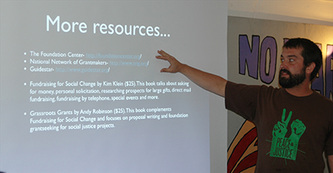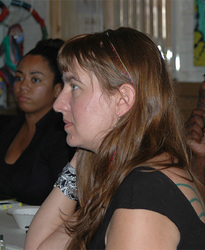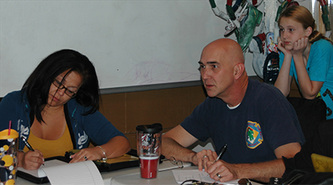Thirteen activists gathered around a table at the Midsouth Peace and Justice Center representing a variety of causes. However, they all shared one common need. The grassroots groups needed funding to fulfill the mission expressed by each of the groups.
MSPJC Executive Director Jacob Flowers directed the Founding and Funding Grassroots Organization workshop on Sept. 21 at the Center’s Southern Avenue headquarters. He was quick to point out that the three-hour session was not a grant writing workshop.
“Grants come with some pretty significant strings attached,” he explained. “Your group should be led by the community they are actually sustaining. The people that should be driven to support it are the people most affected by it.”
As the participants introduced themselves, they revealed a diverse list of causes including rights for the disabled, environmental activism, community natural health, youth guidance, issues centered around the homeless and others.
Leland and Bree Hopkins began the Brown Bag Project just four weeks prior to the session and brought along their 11-year-old daughter, Charis. Their mission is to feed the homeless and hungry street people who gather around Court Square and other parts of the city. It began in the kitchen of their Cordova home after Bree, 34, recently became unemployed.
“We attended the session with the hope to learn how to financially sustain our project,” Bree Hopkins said. “Right now, for the most part, we are personally funding this. All supplies are being purchased out of our own pockets.”
“The need in this city has become so great that we know that we cannot financially sustain this on our own,”Bree Hopkins said.
Chloe O’Hearn, 37, represented the Hoop Revival, an organization that supplies hula hoops to children in under-served, Memphis communities. It also conducts activities to support low income and at risk children, families, seniors, veterans and survivors of trauma and abuse.
“Our group has been acting very informally for the last couple of years,” O'Hearn said. “I attended the workshop to get ideas on how to formalize the work we're doing and how to raise funds for our work. Also, we're not sure yet if it makes sense for us to become a 501c3 organization so I got a lot of good information about the pros and cons of doing that, as well as other options for operational models to consider.”
The aforementioned Flowers spent a good portion of his time discussing what he described as the, “Non-profit industrial complex.”
He explained the technical steps a group must take to achieve tax-exempt status as a recognized non-profit organization. The procedure includes forming a board of directors, writing a mission statement and bylaws, obtaining a federal employer identification number from the IRS, filing articles of incorporation with the state, obtaining permits for charitable solicitations and a host of other requirements.
“When you come out of it, you will be open to more funding sources,” Flowers said.
But he warned that a significant amount of money and time must be invested for a group to become a non-profit.
“Twelve months is the quickest,” he pointed out. “But most of the time it takes 18 to 24 months, including a lot of time on the phone with the state and the IRS.”
Flowers went on to explain that even after the non-profit status is achieved, a group must devote a lot of time every year to maintaining it.
“You must file a form 990 with the IRS every year, “ he said. "File an annual report with the state and renew your charitable solicitations permit.”
He warned that groups without the official designation should never refer to themselves as non-profit, but should instead use the term “not for profit.”
The advantages and pitfalls of a wide variety of funding sources were explored, including foundations, government and major donors, but Flowers kept reiterating the importance of grassroots fundraising.
“I came here (MSPJC) 10 years ago with no staff and a $30,000 budget,” he said. “Now we have a staff of seven and a $350,000 budget, and we would not have been here for 32 years if we did not prioritize individual donors.”
Flowers quoted Saul Alinsky, a community organizer, who is well-known in American activist circles who once said, “People who raise their own money will control their own organization.”
While a group’s allies play an important role, an organization that is not run by the people can drift from their mission. He pointed to some non-profits that end up supporting their own status quo.
He identified a number of leadership models, but stressed that all the work can’t happen at the leadership level.
“Consensus or modified consensus ensures that everybody’s voice is heard,” he said.
Memphis is a good market for fundraising because the city is near the top of the list for charitable giving in the nation. He cited a number of methods for attracting donors, including direct mail, email campaigns, phone-a-thons, membership appeals, matching campaigns, sustaining funds, emergency fund drives and on-line giving.
Flowers listed a dozen ideas for special events that could be organized as money-making vehicles as well.
“There are a number of ways to create opportunities,” he said. "But the biggest challenge is overcoming the innate fear of asking people for money. Most importantly, you’ve got to talk about the work when you’re fundraising. Raise money for your issue – not your overhead.”
Participants seemed to absorb the abundance of information presented in the afternoon session and asked questions based on their particular group’s situation. Bree Hopkins seemed pleased with what she had learned.
“Ultimately, we left the class with knowledge on how to create a long term plan,” she explained. “We learned how to get from where we are to where we want to be. The fundraising concepts and ways to reach others about our mission were the most important lessons.
“The class gave us several ideas on how to reach potential donors,” continued Bree. “It also gave us resources to utilize along the way, from books to websites that will aide us in turning our small family idea into a change-making ministry. Hands down, we envision that the brown bag project will make a difference.”
MSPJC will conduct three more workshops before the end of the year, aimed at helping groups and individuals organize and spread their message effectively.
The Media 201 Workshop is scheduled for Oct. 26. Core Organizer Training will be offered Nov. 8-10, and Training for Social Action Trainers will be conducted Dec. 6-8. Cost for the sessions is based on a sliding scale. For more information, interested parties may call 901-725-4990 or check the MSPJC website.



 RSS Feed
RSS Feed